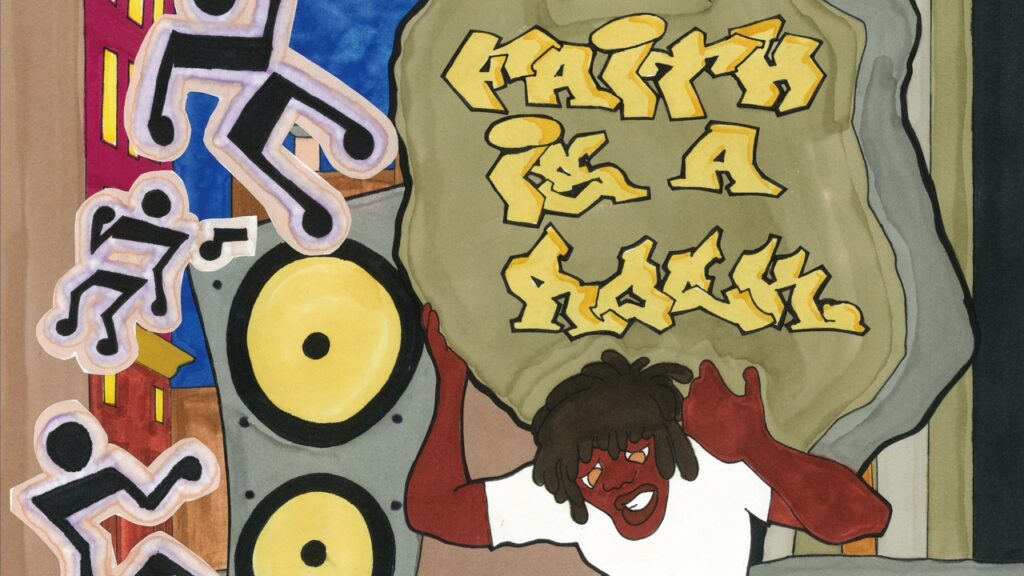
The Alchemist is not an unrealistic man; he understands that even his powers have limits. In an interview with Tidal in late 2022, the legendary beatmaker admitted that a full-length collaboration with two artists presents unique challenges. “It’s always a little different when you’re working with two people,” he said. “The result is just so much more unpredictable.” When he and New York rappers MIKE and Wiki announced that they were teaming up for Faith Is a Rock, it was logical to question how the trio would work together on an album. Fortunately, on “Bless” and “Sentry,” two of MIKE’s recent collabs with the Alchemist, his relaxed, almost lethargic raps sounded right at home.
But introducing Wiki’s winding, introspective monologues into the fold created the potential for an overcrowded landscape. Faith Is a Rock soothes any potential fears; MIKE and Wiki navigate the Alchemist’s warped terrain as equals. They achieve a balance similar to Freddie Gibbs and Curren$y on 2018’s Fetti, delivering biting quotables and meandering soliloquies that reveal the full breadth of their powers. Over the 32-minute runtime, their raps never recede into the all-consuming mass of the Alchemist’s thick sample loops.
This year has been prolific for the Alchemist: He executive produced three records (and one deluxe version), including Voir Dire, his most recent joint album with Earl Sweatshirt. But making that much music in succession could deplete anyone’s creativity: At some point, the boom-bap beats might start to resemble each other. Faith Is a Rock avoids that trap, introducing enough mood changes to keep things dynamic, all without sacrificing the overall tenor of the album. There are small but striking details scattered throughout, like the ghostly wails and sci-fi sound effects that adorn “Odd Ways,” the cartoonish chorus that carries the bare-bones background of “Bledsoe,” and the sound of pencil scratching on paper on “Scribble Jam.” The 45-year-old producer also incorporates vignettes, sprinkling in Gil Scott-Heron vocals, Bob Dylan recordings, and narrations from classic Western films as short intros. The focus here isn’t necessarily pushing the envelope, but crafting an environment that’s comfortable for both MIKE and Wiki.
That approach ensures that the spotlight remains on the raps. When MIKE and Wiki on are on the same track, they are like two savvy veterans on the court working in lockstep with each other, expertly assessing their next moves. They grant each other space from the outset; on the opener “Stargate,” which boasts a string sample that sounds like it was ripped from a ’70s Blaxploitation film, is a prime example. Wiki drifts through autobiographical details, reminiscing about “sippin’ 40s at the 40th Pier,” and his words bleed fluidly into MIKE’s bars without losing momentum. Only two tracks here are solo efforts, a welcome homeostasis that allows each rapper to flex their gifts. Whether they’re trading truncated stanzas or spreading their legs out, neither feels rushed. There’s an intrinsic ease that rests in this relationship, a natural chemistry that feels like it’s existed for decades.
That balance is paramount, because MIKE and Wiki have a lot to say. Their knack for lucid self-awareness and radical honesty is only matched by their sharp social commentary. On the standout “Mayors a Cop,” Wiki breaks down his city’s failures with a quiet fury: “The block is hot, shit, this how they chose to use the guap/With this amount of human laws/Could’ve been for schools or parks,” he raps. You can feel the exasperation swelling with every syllable; he sounds like someone sitting on the stoop airing his frustrations to anyone on the street who’s willing to listen. On “Stargate,” MIKE takes aim at the external pressures that caused strife in his upbringing. “And where do pity belong and will the harm fade?/Product of them immigrant laws, infinite heartache,” he raps, recalling how he was separated from his mother for several years after he moved back to the U.S. from England.
Faith Is a Rock’s tracks feel familiar and warm, but never register as retreads of old territory. MIKE and Wiki aren’t swept away in Alchemist’s endless sea of serene, sample-laden beats; they establish themselves as careful explorers, claiming their rightful place in the upper echelon of Alchemist collaborators. On the album’s finale (and lead single) “One More,” triumphant strings and a stirring soul vocal feel like the fanfare of a coronation. Here, two worthy champions sit on a throne crafted from their own excellence.
